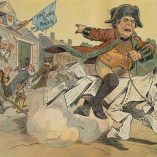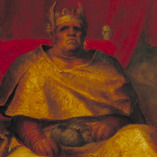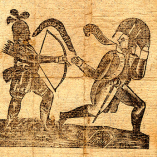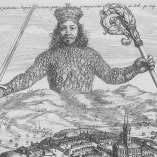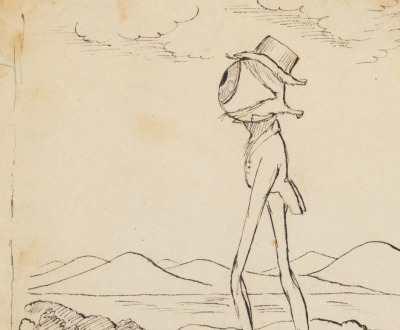
Illustration of “the transparent eyeball” concept, by Christopher Pearse Cranch, c. 1837. Wikimedia Commons.
“In this part of the essay, Emerson is talking about walking a lot, you know, sort of walking through nature, taking a stroll,” says James Marcus in this week’s episode of The World in Time. “He has this rather sublime experience, and he describes it in this way: ‘Standing on the bare ground, my head bathed by the blithe air and uplifted into infinite space, all mean egotism vanishes. I become a transparent eyeball. I am nothing. I see all. The currents of the universal being circulate through me. I am a part or particle of God.’ Now, I mean, that is lofty stuff, and it can edge over into silliness. In a way, if you picture it, it starts to be silly and that is why Christopher Cranch’s cartoon is hilarious, because a literalization of it is kind of ridiculous, in a way. Part of the thing I love about Emerson is that he wasn’t afraid to seem silly in his eagerness to render the experience. What he’s talking about—if you get away from the actual image of an eyeball with a top hat on—is a kind of ecstatic merger with the universe, where the walls drop, the boundaries drop, the currents of the universe move through you. If you look at it that way, he’s talking about a classic ecstatic experience.”
This week on the podcast, Donovan Hohn speaks with writer and biographer James Marcus about his book Glad to the Brink of Fear: A Portrait of Ralph Waldo Emerson. Emerson’s sense of self was, Marcus says, “kaleidoscopic,” and so is this episode, presenting not one Emerson but many: Emerson the public intellectual who cherished the privacy of his study, Emerson the lapsed minister who left the church but continued to preach on the lyceum circuit, Emerson the initially reluctant but eventually ardent abolitionist, Emerson the Swedenborgian mystic, Emerson the loner who deeply loved his friends Margaret Fuller and Henry Thoreau, Emerson the son estranged from his father, Emerson the father undone by grief for his dead son, and, finally, Emerson the volunteer firefighter. Marcus and Hohn also go searching for Emersonian influences in “The Mast-Head” chapter of Moby Dick. But they spend most of the conversation with the essayist from Concord, that artisan of indelible sentences, whom Melville once compared to a great philosophical whale who could dive “five miles or more,” sounding the depths.
Earlier episodes in our series about Moby-Dick: Episode 7 with Daniel Mendelsohn, Episode 8 with Wyatt Mason, and Episode 10 with Francine Prose.
WORKS CITED
(In order of mention.)
“Drama Queens with Daniel Mendelsohn.” A New York Review Seminar, beginning September 10, 2025.
“The Political Novel with Edwin Frank.” A New York Review Seminar, beginning September 8, 2025.
James Marcus. Glad to the Brink of Fear: A Portrait of Ralph Waldo Emerson. Princeton: Princeton University Press, 2024.
Herman Melville. Moby Dick: A Norton Critical Edition. Edited by Hershel Parker. New York: W.W. Norton, 2017.
James Marcus. Amazonia: Five Years at the Epicenter of the Dot.Com Juggernaut. New York: The New Press, 2011.
Ralph Waldo Emerson. Essays and Lectures. New York: Library of America, 1983.
Ayn Rand. Atlas Shrugged. New York: Signet, 1996.
Walt Whitman. “Song of Myself.” In Leaves of Grass. Introduced by John Hollander. New York: Library of America, 2011.
Immanuel Kant. Critique of Pure Reason. Translated and edited by Marcus Weigelt. New York: Penguin Classics, 2008.
George Berkeley. Principles of Human Knowledge and Three Dialogues. Edited by Howard Robinson. Oxford: Oxford University Press, 2009.
William Paley. Natural Theology. Edited by Matthew D. Eddy and David Knight. Oxford: Oxford University Press, 2008.
Nathaniel Hawthorne. The House of the Seven Gables. Edited and introduced by Milton R. Stern. New York: Penguin Classics, 1981.
Henry David Thoreau. Walden. New York: Everyman, 1995.
Emanuel Swedenborg. Heaven and Hell. Translated by George F. Dole. Royersford, PA: Swedenborg Foundation, 2010.
Aristotle. The Metaphysics. Translated and introduced by Hugh Lawson-Tancred. New York: Penguin Classics, 1999.
Plato. The Republic. Translated by Christopher Rowe. New York: Penguin Classics, 2012.
Margaret Fuller. The Essential Margaret Fuller. Edited by Jeffrey Steele. New Brunswick: Rutgers University Press, 1992.
Donovan Hohn. “Episode 5: Ben Tarnoff and John Jeremiah Sullivan.” The World in Time from Lapham’s Quarterly, July 4, 2025.
David W. Blight. Frederick Douglass: Prophet of Freedom. New York: Simon & Schuster, 2020.
Herman Melville. The Confidence-Man. Introduced by Tory Tanner. Oxford: Oxford University Press, 2009.
Herman Melville. “Herman Melville letter to E.A. Duyckinck.” The New York Public Library Digital Collections, 1850.
William Braswell. “Melville as a Critic of Emerson.” American Literature, November 1937.
John Milton. Paradise Lost. Edited by John Leonard. New York: Penguin Classics, 2003.
Robert A. Gross. The Transcendentalists and Their World. London: Picador, 2022.

